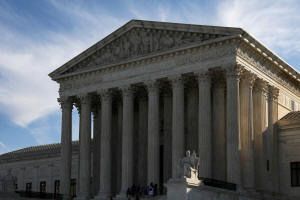U.S. Supreme Court spurns Republican bid to defend Trump immigration
rule
 Send a link to a friend
Send a link to a friend
 [June 16, 2022]
By Andrew Chung [June 16, 2022]
By Andrew Chung
The U.S. Supreme Court on Wednesday
dismissed a bid by Republican state officials to take over the legal
defense of a hardline immigration rule imposed under former President
Donald Trump barring permanent residency for immigrants deemed likely to
need government benefits.
The unsigned one-sentence ruling "dismissed as improvidently granted" an
appeal by 13 Republican state attorneys general led by Arizona's Mark
Brnovich seeking to defend the rule in court after Democratic President
Joe Biden's administration refused to do so and rescinded it. The rule
widened the scope of immigrants deemed likely to become a "public
charge" mainly dependent on the government for subsistence.
The state attorneys general had hoped to ask lower courts to throw out
decisions that sided with various challengers to the rule, including a
number of Democratic-led states.
Biden's administration in February proposed a new public charge rule
that it called more "fair and humane." It would avoid penalizing people
for seeking medical attention and other services.

Trump's rule was in effect from February 2020 until Biden's
administration rescinded it in March 2021, acting on a decision in a
separate legal case in Illinois that vacated the rule nationwide.
Republican state officials also sought to intervene in that case in
their uphill battle to revive Trump's rule.
U.S. guidelines in place for the past two decades had said immigrants
likely to become primarily dependent on direct cash assistance or
long-term institutionalization, in a nursing home for example, at public
expense would be barred from legal permanent residency, known as a
"green card."
[to top of second column]
|

People visit the U.S. Supreme Court building in Washington, U.S.
March 15, 2022. REUTERS/Emily Elconin/File Photo

Trump's policy expanded this to anyone deemed likely
to receive a wider range of even non-cash federal benefits such as
the Medicaid healthcare program, housing and food assistance for
more than an aggregate of 12 months over any 36-month period.
The San Francisco-based 9th U.S. Circuit Court of Appeal decided in
2020 that Trump's policy impermissibly expanded the definition of
who counts as a "public charge" in violation of a federal law called
the Administrative Procedure Act. Other courts made similar rulings.
Brnovich sought to intervene in a challenge to Trump's immigration
rule involving three lawsuits, including two filed in California and
Washington state by 18 mostly Democratic-led states and the District
of Columbia. Brnovich was joined by officials from Alabama,
Arkansas, Indiana, Kansas, Louisiana, Mississippi, Missouri,
Montana, Oklahoma, South Carolina, Texas and West Virginia.
The Republican officials said the public charge rule would save
states more than $1 billion annually by limiting the immigration of
individuals who are not self-sufficient.
During the time the policy was enforced, the government issued only
five adverse decisions under it, according to court filings, all of
which have since been reversed.
The U.S. Supreme Court on March 3 ruled that Kentucky's Republican
attorney general could seek to restore a restrictive abortion law
after the state's Democratic governor dropped defense of the statute
when lower courts struck it down.
(Reporting by Andrew Chung in New York; Editing by Will Dunham)
[© 2022 Thomson Reuters. All rights
reserved.]
This material may not be published,
broadcast, rewritten or redistributed.
Thompson Reuters is solely responsible for this content. |